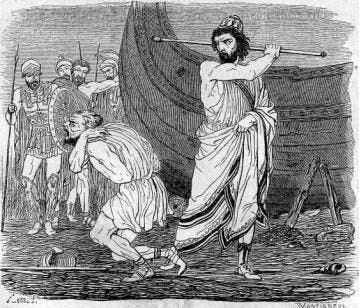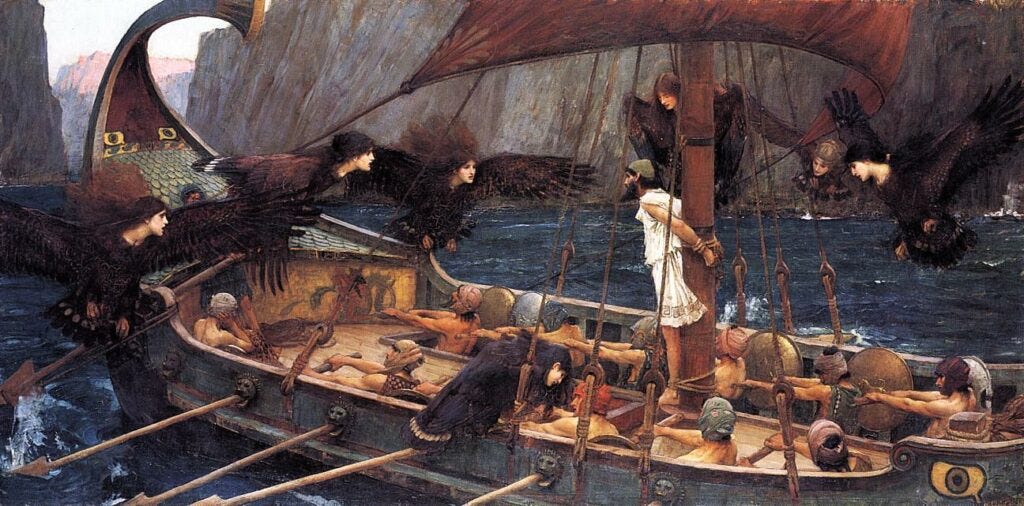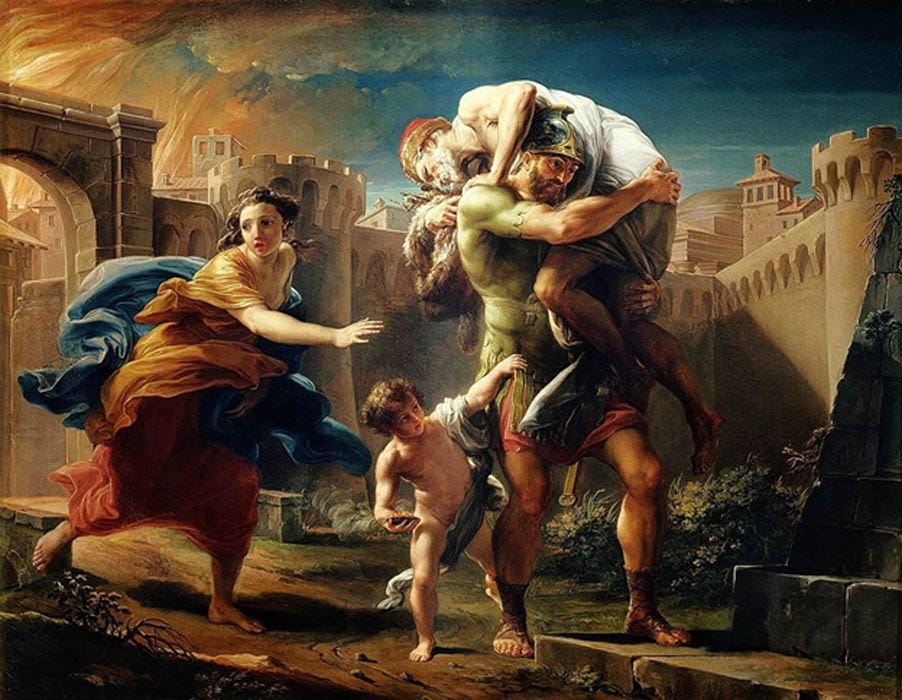
And then a hero comes along
With the strength to carry on
And you cast your fears aside
And you know you can survive
So when you feel like hope is gone
Look inside you and be strong
And you'll finally see the truth
That a hero lies in you
Dear Classical Wisdom Reader,
Right now Mariah Carey’s classic croon is living rent-free in my head. Perhaps it dates me a little too much, but the (dare I say) epic “Hero Comes Along” 1993 song was a defining moment for my generation, regularly the first CD purchased with precious pocket money.
What was great about the song, of course, was not only did it dare to encapsulate what a hero is… it proposed that we were all heroes… inside.
A lovely concept, of course! But does Mariah’s version of what a hero is hold up to modern standards even twenty years later?
After all, the idea of a hero surely changes from time and place? From Super heroes and sci-fi/fantasy figures to the ancient myths and real life champions, what makes someone so special they achieve that status?
Essentially, what makes a hero?
Comment below for what you think are the defining qualities of a hero both now and throughout time (if there are universal hero qualities?)
And to get you started and inspired, read on to discover what the ancients felt was the heroic ideal… You might not agree…
Speaking of Odysseus, some of you might have seen the latest buzz about a brand new translation of the Odyssey, out next week! In fact, its by one of our esteemed panelists, Daniel Mendelsohn, who will be speaking at Classical Wisdom’s event next month, “Plato and the Tyrant”.
Daniel’s new translation is described as a “vividly rendered experience”… As such, we will be sending Classical Wisdom Members an exclusive extract to discuss the language, translations, and how best to read these ancient works.
For all lovers of the epics and ancient wisdom, make sure to check out Daniel’s translation of the Odyssey Here.
All the best,
Anya Leonard
Founder and Director
Classical Wisdom
P.S. Attention Heroes and Patrons of the Classics! Now more than ever, when the world needs a hero to come along, we need the insights of those who came before us. As such, and as long time readers of these pages know, our mission here at Classical Wisdom is to bring ancient wisdom to modern minds. To that end, we feature an extensive archive of ebooks, podcasts with professors, exclusive live events and a wealth of other resources for our paying members.
You can support our growing project by helping to keep the Classics alive and joining our community today:
Odysseus and Aeneas: Ancient Ideals of Heroism
by Andrew Aulner, Contributing Writer, Classical Wisdom
A quote attributed to Steve Jobs says, “You can tell a lot about a person by who his or her heroes are.” The ancient Greeks and Romans were certainly no different. In antiquity, poetry was considered one of the highest forms of cultural expressions, and no heroes are more central to the epic verse of Greece and Rome than the protagonists Odysseus and Aeneas, respectively.
What can the attributes of each of these legendary heroes show us about the differences between the cunning Greeks and the noble Romans?
Odysseus as the Guileful, Well-Spoken General in the Iliad
Odysseus (sometimes referred to by the Roman version of his name, “Ulysses”), is the king of Ithaca and the central character of the Odyssey, but he also serves as an important supporting character in the Iliad. Whereas the prideful, intemperate Achilles is the protagonist of the Iliad, Odysseus shines in both poems as the archetypal Greek hero: capable in battle, cunning in stratagem, and a master of oratory.
Early in the Iliad, a Greek loudmouth named Thersites insults the chief general-king, Agamemnon. Odysseus orders him to hold his tongue and follows his threat up with a blow across Thersites’s back, which sends the complainer into a fit of tears. The Greek soldiers, or as they are referred to in Homer’s work, the Achaeans, praise Odysseus for his physical skill, though a secondary motive for Odysseus’s violent action is soon revealed.
Odysseus is wise and cunning enough to foresee the danger of letting a blabber like Thersites diminish the Greek morale and thereby decrease their odds of success against the Trojans, so he keeps up morale by literally whipping Thersites into shape and following it up with a speech.
The king of Ithaca displays an impressive use of rhetoric by encouraging Agamemnon and the surrounding Achaeans through an oration. Through both his physical action against Thersites and his motivational words of comfort to the troops, Odysseus shows that he is a strong man, a high-level orator, and a long-term thinker.
Throughout the Iliad, Odysseus is referred to as an almost peerless advisor and planner. Agamemnon himself says that the king of Ithaca overcomes other Greeks in debate skill, and the poem’s narrator refers to Odysseus as a rival to the chief god Zeus in his ability to render counsel. For example, after his rousing speech to the Greeks, Odysseus prudently advises Agamemnon to divide the Greeks by clan and tribe so that it can be ascertained which group is performing poorly in battle.
Helen of Troy describes Odysseus to the Trojans as a crafty tactician from a rugged country, “quick at every treachery under the sun” and “a man of twists and turns” (Iliad III.243-44). That these attributes are the first to leap to Helen’s mind as she observes the Greek champions from afar speaks volumes about the king of Ithaca’s defining characteristics. He is a tough, capable enough warrior who is most especially distinguished by his skills in quick thinking and long-term strategy.
Odysseus’s mental and tactical cunning shines through in non-deadly combat as well. During the funeral games for Achilles’s friend, Patroclus, Odysseus wrestles with Ajax, who is notable for his massive size. However, Odysseus proves to be nearly equal to Ajax in terms of sheer brawn and fights the larger man to a draw through technical wrestling skill.
As a powerful speaker and level-headed thinker, Odysseus is the natural choice to lead a delegation to implore Achilles to return to battle against the Trojans. Odysseus begins with a toast and uses his rhetorical skill to praise Achilles’s hospitality and describe the Greek army’s urgent need for Achilles. He appeals to Achilles’s pity for the common soldiers who are doomed to die without him and sensibly points out the dangerous nature of grudges, including the one that Achilles is harboring against Agamemnon over a woman.
Perhaps the closest thing to a deficiency in Odysseus’s character in the Iliad is his retreat from battle halfway through the poem, which takes place after Zeus uses his divine powers to turn the tide of the fight in favor of the Trojans. One of the dying Greek soldiers suggests that Odysseus is a coward for turning and running.
However, Homer does not condemn Odysseus as a coward in his narration, nor do any of the other characters do so after the battle. This may be a sign that the ancient Greeks sometimes valued doing something that was tactically smart even if it appeared to be dishonorable or cowardly in the moment.
Whether or not this instance was a failing on Odysseus’s part, he demonstrates plenty of martial courage in the rest of the poem. He engages in a covert mission to spy on the enemy, kills multiple named skilled Trojan warriors in pitched battle, and holds his own while outnumbered after his fellow soldiers flee from a Trojan counterattack. Odysseus bravely continues fighting even after being wounded until he is rescued by Menelaus.
Throughout the Iliad, Odysseus is shown to be just as brave and a clearer thinker than Achilles or Ajax, a better speaker than Menelaus, and a more cunning leader than Agamemnon.
Odysseus as the Cunning Survivor in the Odyssey
Odysseus’s brilliance after leaving Troy in the Odyssey is legendary. In one of the most famous incidents from The Odyssey, Odysseus and his men escapes being trapped in a cave by a Cyclops named Polyphemus.
The king of Ithaca provides the giant with a false name, “Nobody,” then he distracts the Cyclopes with drink and leads his men to gouge out the giant’s single eye with a wooden stake. Odysseus’s naming ruse succeeds when Polyphemus is unable to ask for help from his fellow Cyclopes, who are confused when he says that “Nobody” attacked him.
Odysseus later outwits the witch Circe through the use of a magical herb, has his men escape the lure of the Sirens through plugging their ears with beeswax, and skillfully navigates the narrow sailing space between the monster Scylla and the whirlpool Charybdis. Finally, he is the only crewmember self-disciplined enough to avoid eating sacred cows belonging to the sun god Helios, so he alone is spared from death by shipwreck.
Odysseus continues to rely on his wits even after returning to Ithaca. He first disguises himself in order to perform reconnaissance in his kingdom, thinking on his feet well enough to maintain the illusion even with his own swineherd. After reuniting with his son, Telemachus, Odysseus obtains his last crucial piece of military intel by meeting both his wife’s suitors, who mistreat him in his disguise, and his wife Penelope herself, who confirms her fidelity to her husband.
At the climax of the Odyssey, Odysseus achieves victory by winning an archery competition in disguise before revealing himself and slaughtering the predominantly defenseless suitors. This moment is the marriage between Odysseus’s cunningness and his martial skill, though the victory over mostly unarmed men is not the most honorable feat. Lastly, his rhetoric is put to use once more when he separately proves his identity to his wife Penelope and his father Laertes through his words.
Aeneas as the Duty-Bound Leader in the Aeneid
Both Odysseus and Aeneas are formidable warriors, each of them near the top of their army’s foremost military champions. However, whereas Odysseus is defined more by his cunning and strategic ability than his sheer martial capability, Aeneas is characterized by a combination of military strength and intense devotion to duty, being referred to throughout the Aeneid as “duty-bound Aeneas.”
Virgil begins his epic by declaring Aeneas to be a man of war who is destined to reach Italy. This sense of unwavering intention is a key part of Aeneas’s character, and it is a strong demonstration of the honor-based culture of the ancient Romans. Aeneas possesses certain social, familial, and religious commitments that he is obliged to uphold, regardless of his personal desires.
Aeneas’s priorities are to those around him, especially his family. After the Greeks finally conquer Troy through the schemes of Ulysses (remember, that’s the Roman name for Odysseus), who crafts the Trojan Horse, Aeneas attempts to beat back the invaders before realizing that he can’t save the city by himself. Aeneas instead turns his focus toward saving his family, including his son, wife, and father. Unfortunately, Aeneas’s wife dies during the escape, but Aeneas nevertheless succeeds in putting his loved ones first and ensuring the safety of the rest of his family members above his own.
With Troy sacked, Aeneas leads his family and the other survivors out to sea. After receiving a prophecy that he is honor-bound by destiny to find Italy, he undergoes sea wanderings that parallel the Odyssey, including encountering the whirlpool Charybdis and finding the island of the Cyclopes.
Aeneas’s sense of honor and duty is so strong that, even after falling in love with Dido, the queen of Carthage, Aeneas returns to his sea voyage after the gods remind of his destiny, which will also determine the fate of his family. Tragically, Aeneas’s choice of duty over love leads Dido to kill herself.
Honor and fair play are at the center of the funeral games that Aeneas later holds in honor of his departed father, Anchises. The Trojan leader presides over the games with a consummate sense of fairness and implores both winners and losers to play well and avoid grudges. Such nobility is a sign of Aeneas’s honorable leadership.
The Trojans finally land on Latium in western Italy, where they encounter several native peoples, including the Latins. Thanks to the meddling of the gods and the hotheadedness of a rival king named Turnus, war breaks out between the parties. Aeneas’s friend Pallas is killed, and Aeneas responds in kind by killing a friend of Turnus’s named Mezentius, although Aeneas honorably faces him in single combat rather than kills him through subterfuge.
As the war progresses, the honorable Aeneas is contrasted with Turnus when the latter turns down the offer of single combat, which would save the lives of Turnus’s soldiers but would likely lead to his death. After demonstrating his military prowess and leadership in another skirmish, Aeneas is finally able to confront Turnus, whom he defeats in a duel.
In the ending lines of the poem, Aeneas contemplates heeding Turnus’s plea for mercy, only to catch sight of the enemy in possession of the slain Pallas’s sword belt. Filled with rage, Aeneas kills the defeated Turnus. While Virgil died before he finished editing the Aeneid and may have intended a different ending, this scene between Aeneas and Turnus still serves as a stark portrayal of an honor-based culture that is not tempered by what Shakespeare called “the quality of mercy.”
Conclusion
Odysseus is warrior-king who is equal parts clever, tough, and well-spoken. These attributes reflect the Greek values of cunningness, martial strength, and rhetorical skill.
Aeneas is a warrior-king who fights well and always puts duty to country, family, and the gods first. These characteristics were important for the Romans, who observed a strict code of honor and valued patriotism, familial ties, and religious devotion.
From each of these two great heroes, we gain fabulous insights into the societies of classical antiquity.
Más info en https://ift.tt/8fp1Jns / Tfno. & WA 607725547 Centro MENADEL (Frasco Martín) Psicología Clínica y Tradicional en Mijas. #Menadel #Psicología #Clínica #Tradicional #MijasPueblo
*No suscribimos necesariamente las opiniones o artículos aquí compartidos. No todo es lo que parece.



No hay comentarios:
Publicar un comentario